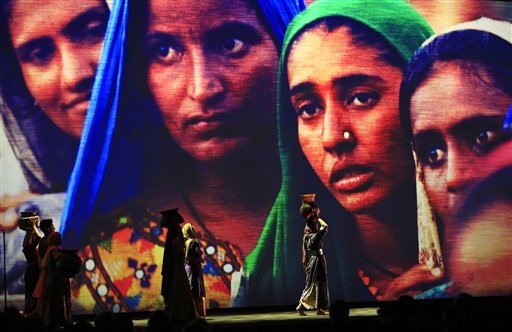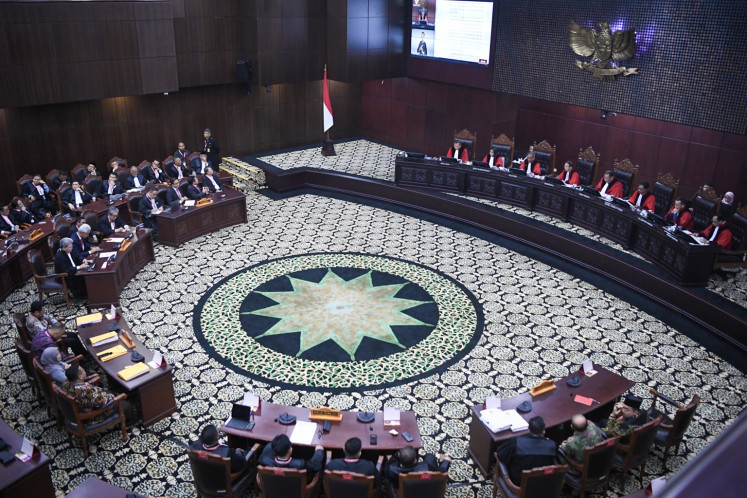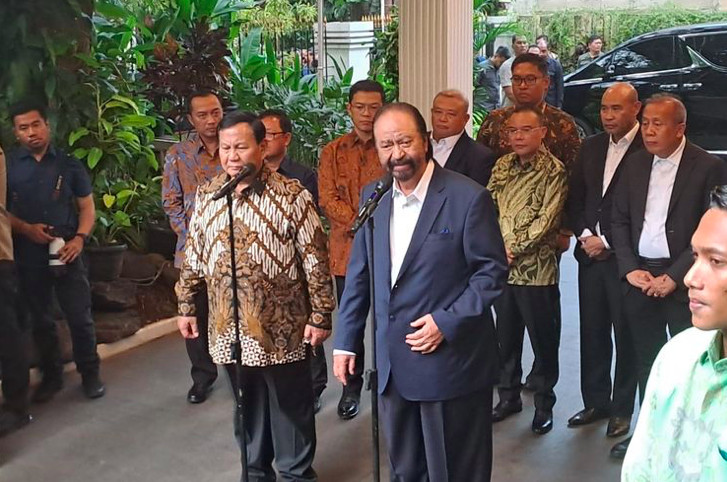The summit for humanity
Over 40.8 million people are displaced within their own country as a result of conflict and violence and a further 20.2 million people have sought refuge in other countries. In 2015 alone, 19.2 million people were displaced due to natural disasters in 113 countries.
Change Size
 Backdropped by a projected picture of refugees, actors perform during the opening ceremony of the World Humanitarian Summit, in Istanbul, Monday. (AP/Lefteris Pitarakis)
Backdropped by a projected picture of refugees, actors perform during the opening ceremony of the World Humanitarian Summit, in Istanbul, Monday. (AP/Lefteris Pitarakis)
T
his week at the first ever World Humanitarian Summit in Istanbul, leaders from governments, international agencies, the private sector and civil society will gather to announce their commitments to address some of the most critical challenges we face today.
The needs for the summit are clear: conflicts that know no end causing untold suffering, mass displacement and political and economic turmoil; flagrant violations of international humanitarian law; eye-watering levels of hunger and child malnutrition; more severe and more frequent natural disasters linked to climate change; and growing inequality that is cutting off millions from development progress.
The statistics are staggering: More than 130 million girls, boys, women and men are in need of access to humanitarian assistance and protection and the numbers keep on rising.
Over 40.8 million people are displaced within their own country as a result of conflict and violence and a further 20.2 million people have sought refuge in other countries.
In 2015 alone, 19.2 million people were displaced due to natural disasters in 113 countries.
Prioritizing the most vulnerable, the United Nations and its humanitarian partners are seeking almost US$21 billion to provide aid in 40 countries for the immediate life-saving needs and protection of 91 million people.
Yet, almost half-way into the year, $17 billion of that vital $21 billion is still missing, denying our ability to assist people who in many cases have lost everything.
When UN Secretary-General Ban Ki-moon called for the first-ever World Humanitarian Summit four years ago he recognized that the status quo cannot continue.
World leaders, be they of states or NGOs, the UN and its funds, agencies and programs, the private sector, civil society and academia, must grapple with the reality of humanitarian needs spiralling out of control.
Coming together, we have this once in a generation opportunity to set in motion an ambitious agenda to change the way that we alleviate, and most importantly prevent, the suffering of the world’s most vulnerable people.
To succeed, the Secretary-General in his “Agenda for Humanity” calls for commitments and actions that focus on catalysing change in five areas: unleashing political will to prevent and resolve conflicts; stronger implementation of international humanitarian law and an end to impunity for perpetrators; ensuring that no one is left behind in striving for sustainable development, including the millions affected by crises; developing more diverse partnerships to reduce humanitarian need and build resilience; and investing in humanity by mobilizing new resources and improving efficiency and effectiveness in life-saving and protection humanitarian response.
None of these — and many other — changes will be possible unless we find smarter ways to finance and mobilize resources to not only alleviate suffering but reduce vulnerability and address risk.
This will require us to diversify, as well as intensify, our funding base and adopt a more innovative set of tools, such as social safety nets, cash responses, disaster insurance, to protect people at risk.
We must invest in people and in approaches with more flexible, multi-year funding, changing the way donors conceptualize and finance need at its very foundation.
These are just some of the calls for change that we will catalyze at the World Humanitarian Summit.
We will also see the launch of dozens of ambitious and realizable initiatives, the scale and scope of which attest to the vibrancy and diversity of the humanitarian sector: To stem the swelling number of displaced people, we will call on leaders to commit to halve the number of internally displaced people from 40 million in 2016 to 20 million by 2030, as well as to present policy, legal and financial solutions to improve the protection of refugees.
To reduce the human cost of disasters and protracted conflicts we will call on leaders to support a new “Global Preparedness Partnership”, which aims to achieve a minimum level of readiness for natural disasters in 20 countries by 2020.
We will also seek far more investment from donors and partners in risk reduction before crises play out.
We will launch the Connecting Business initiative, which will transform private sector engagement in disaster risk reduction, emergency preparedness, response and recovery at the local, national and regional levels.
There will also be new partnerships on global health emergencies and urban crises. To strengthen the safety, health and economic well-being of the world’s most vulnerable one billion people we will call on leaders to join the “One Billion Coalition for Resilience”.
And to deliver on the right to education for the 75 million children whose schooling has been interrupted by crisis, the UN Special Envoy for Global Education will launch an ambitious platform and fund for education in crises.
Over the past few decades, humanitarians have improved every aspect of humanitarian response: stronger analysis; better cooperation; more local and national capacity; and higher operational standards.
Yet, building on the best we must never stop striving to improve, to become more effective and efficient at saving and protecting more lives.
As part of this determined drive, we will ask leaders across the humanitarian spectrum to sign on to a “Grand Bargain” between donors and agencies to get more means into the hands of people who need them, by redirecting one billion dollars in efficiency savings to the front-line of humanitarian action over the next five years.
In signing up to this bargain, aid agencies agree to improve the efficiency and accountability of the money we spend. We recognize that these changes will not always be comfortable or easy.
They will involve disagreement and compromise. Last year through Sendai, through the climate change agreement and the 2030 Agenda, leaders showed that we can put the global good and affected people at the heart of our collaboration.
The Summit presents a historic, ground-breaking opportunity and it is our moral responsibility as leaders to take action — the cost of not doing so, is too high.
That is why all leaders are now called upon to come to the Summit to make — and act on — commitments to support the Agenda for Humanity: to show the peoples of the world that we care and to share our common humanity.
The millions of people affected by crisis the world over need us all — we owe it to ourselves to act; and those caught up in crisis deserve nothing less from all of us in a position to do something about relieving their suffering.
Join us!
***
The writer is United Nations Under-Secretary-General and emergency relief coordinator.
---------------
We are looking for information, opinions, and in-depth analysis from experts or scholars in a variety of fields. We choose articles based on facts or opinions about general news, as well as quality analysis and commentary about Indonesia or international events. Send your piece to community@jakpost.com.









